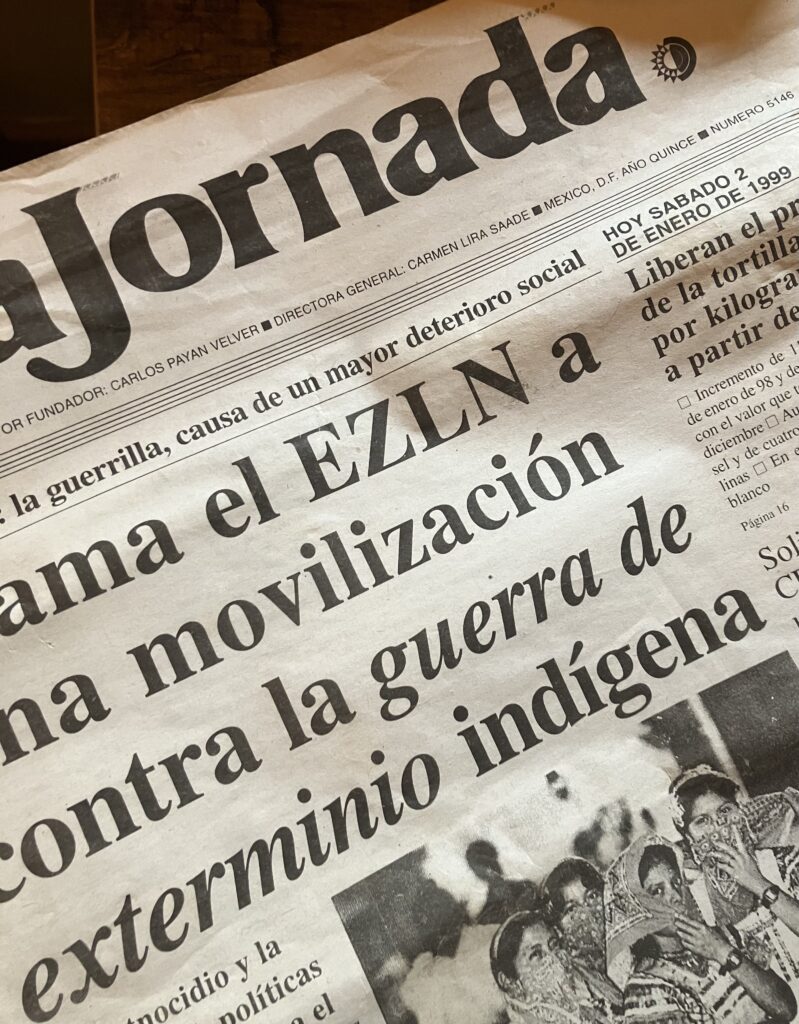Raul Romero*

Violence in Mexico is intensifying. The electoral campaigns are not enough to hide the war that has spread throughout the country. In Michoacán, the Nahua community of Santa María Ostula, which for years has been resisting the triangle of violence to which the State, criminal corporations and the mining business have subjected it, is now experiencing attacks by the Jalisco Cartel – New Generation (CJNG). The community members of Santa María Ostula defend their territory, and their resistance has led them to strengthen communal structures such as the Communal Guard, or to adopt forms of solidarity economy. This community, which is an example of resistance in Mexico and the world, experienced an attack by an armed group on February 5 at night. The aggressions lasted several days.
In Guerrero, which has not yet recovered from the impacts of Hurricane Otis, truck drivers have stopped work, demanding security to carry out their work. They are daily victims of assaults, extortion, kidnappings and murders. In Chilpancingo, the state capital, classes are suspended, cab drivers do not work and different businesses do not open due to threats of attacks by organized crime. In Iguala, the municipal president David Gama Perez announced the suspension of the Flag Fair 2024, which was to begin on February 24. Terrible paradox in a country that boasts its patriotism and promotes it as a mobilizing force.
In Zapatista territory, in Chiapas, overt or covert repression is a daily occurrence. According to the Red Todos los Derechos para Todos, Todas y Todes, on January 19, 2024, 28 people were forcibly displaced from the support bases of the Zapatista Army of National Liberation, inhabitants of the Local Autonomous Government, La Resistencia community in the region of Moisés and Gandhi. Among the displaced persons are 10 children. The displacement was allegedly caused by members of the Regional Organization of Coffee Growers of Ocosingo (Orcao). Using firearms, machetes and sticks, the Orcao paramilitaries also destroyed an autonomous elementary school, 15 houses made of tin and wood, and crops, while burning books and stealing a store, animals and work tools from the Zapatista support bases.
In general, the phenomenon of forced displacement in Chiapas is extremely serious. The turf war between the criminal corporations operating in the region has caused thousands of families to abandon their homes. In addition to this, there have been displacements by paramilitary groups already operating in the region. According to data for March 2023, the Fray Bartolomé de las Casas Human Rights Center documented in its report Chiapas a disaster. Between criminal violence and State complicity, between 2018 and 2022, the displacement of 3 thousand 499 people from the municipality of Aldama and 5 thousand 23 from Chalchihuitán, in July 2021, in the municipalities of Pantelhó and Chenalhó 3 thousand 200 people were documented, in the ejido Guayabal Esquipulas, municipality of Chapultenango, Zoque territory, 87 people left their homes and in 2022 in the ejido Santa Martha, municipality of Chenalhó, 250 were displaced. The same report indicates: through dialogue with churches, organizations working in the area and cases documented by Frayba, it is estimated that in the border region there have been approximately 2,000 people (400 families) who have had to leave their communities due to violence resulting from disputes between criminal groups for control of territory.
In Baja California, Angela Meraz Leon, president of Union y Fuerza por Nuestros Desaparecidos Tecate, who was looking for her missing brother, was murdered. Angela’s reality is unfortunately not an isolated case. Mothers searching for missing persons are being harassed by criminal groups, they are making their situation precarious due to long search processes that undermine their health and finances. The phenomenon of forced disappearance does not stop, and the organizations of searchers do not find an interlocutor within the government, even worse, they find confrontation from the official discourse. The case of Ayotzinapa is very representative: they have tried to fracture their organization and delegitimize the organizations and lawyers that accompany them.
In his popular song Periódico de ayer, Héctor Lavoe narrated the story of a love that had similarities with a newspaper article of the previous day: Sensational when it came out at dawn // By noon already established news // And in the afternoon forgotten matter. In addition to the speed of the news, there is the “presentism” into which we as societies have settled and the noise with which certain information is hidden. Unfortunately, violence in our country is not yesterday’s news, it is a present reality that requires us to discuss it as one of the great national problems and to look for real solutions.
*Sociologist
Original article published in La Jornada on February 12, 2024.
Translated by Schools for Chiapas.
